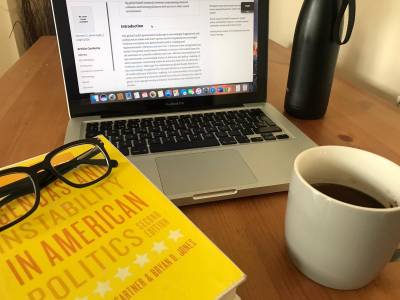
I will not lie and say I haven’t experienced any challenges. Working on my essays for Term 2 modules while being in lockdown has not been easy. Apart from worrying about doing well in my studies, I am also concerned about my family and my friends as well as what my future will be once I graduate from my program.
However, this situation has also taught me the meaning of adaptability and resilience. While we have no control over the pandemic's effects, we can change the way we experience it. In my case, it all began by acknowledging that it was a challenging situation and, while there might be setbacks and obstacles, I needed to continue moving forward. This meant to adapt to the new circumstances, approach learning and working differently, and find techniques to keep me focused on the assessments.
Here are some strategies that have worked for me in the last two months:
- Look after your mental health. It might sound a bit cliché, but sometimes we underestimate how much mental health can help or hinder us. You need to know when you can push yourself to work harder, and when you need a break. It is also very important to know when to ask for help. In my case, it meant reaching out to my professors explaining that I was struggling to work on my assessments. In this regard, UCL, the department of Political Science, and my professors were very understanding about our situations and allowed students to ask for extensions by simplifying the extenuating circumstances application.
- Divide your day between your studies and personal time. In addition to the previous point, it is very important to have a balance between work and leisure. I found that if I only thought and worked on my assessments, it was easier to feel overwhelmed. For that reason, I decided that I needed to find a way to continue my studies and have time during the day for recreational activities, especially because the lockdown has impacted our lifestyles. For example, I use my leisure time in the day to video call my friends and family back home more often, take a walk in the park close to my flat, or just watch a new series.
- Break down the work in small goals. It is very easy to feel overwhelmed about the amount of work required for all the final assessments, especially because deadlines can be very close one to other. One of the techniques I found useful was changing my goals from “I need to write a 3,000 words essay” to “Today I will write 300 words”. By focusing on small, but accomplishable goals it was easier to be motivated.
- Find a strategy that allows you to stay focused. One of the things I found most challenging was to keep my attention on my assessments. A friend recommended an app called Flow that relies on the Pomodoro technique that combines work sessions of 20-30 minutes with shorts breaks that enabled me to focus on the task and reduce time spent on little distractions. When I started to use the time management app, I was able to reach the goal I had set up for the day.
 Close
Close

